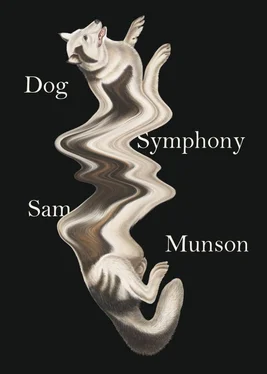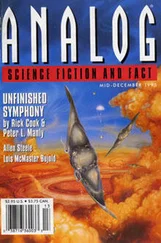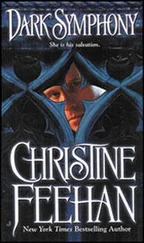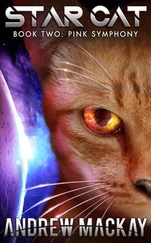Above us was the Illia overpass; the shantytown dwellers had continued building without interruption beneath it; here exterior bulbs dangled more abundantly than before, to compensate for the shadow cast by the overpass and the concrete pylons supporting it; here the lanes widened and wheelbarrow drivers traded loads of finished goods for loads of skins. Around us children furiously unloaded and reloaded wheelbarrows, and they whistled or shouted greetings at the man in the amethyst tracksuit. Katalinski circled and roved through the crowd. I cut out from the overpass shadow, he darted across my path, gave me a sour glance, and vanished behind a cubical house. I walked up a gentle rise. Beyond the low roofs, beyond the railyard, the first greenswards of Recoleta appeared, the Parque Thays and the United Nations plaza, resembling black lakes. Along Mugica, alone and loud, a blue van coursed, and I crouched next to a house where an adolescent woman held a dachshund skin up to the grimy bulb hanging from her ceiling, ignoring me.
In each sharp shadow I saw a security officer, I saw Luxemburg. Hard-beaten dirt spread emptily and tawnily before the doorways. No bowls, no meat, nothing. Blue plastic-walled outdoor toilets (surrounded by clouds of night-born flies) stood in for interior plumbing; filthy rivulets ran down the center of many streets, even down the main streets — children and adults alike plashed through them, spattered in graying muck up to the ankle, up to the knee. The dwellers, too, kept close together, moving in streams or swarms.
Two wheelbarrows collided. The children pushing them, a boy and a girl in identical jeans and T-shirts advertising the Ojea Meat Company, started to swear at each other, swear and laugh. I collapsed against a stack of tractor tires in fear, my knees bent, the porous, stinking rubber struck my right cheek. The girl was heaping up the purses that had slipped from the boy’s wheelbarrow, and the boy was arranging the skins that had fallen from the girl’s (by size, largest to smallest, and with shocking speed). They both kept looking at me as Katalinski had done: with dark, soured glances. After they’d finished loading up the purses once more, they did not seize the wheelbarrows and drive them away but embraced each other, whispering and looking at me. Katalinski appeared and tousled their hair, and they forgot all about me, it seemed. My fear receded. I staggered past the stacked tires, staggered along in the street muck, as the light, heavy tread of Katalinski continued to resound behind me. My lungs burned from the few miles I had walked and from the effort I expended in my assault on the clerk. The long lane stretched into the gray-green darkness, where the houses lost their distinct outlines, where the proleptic haze of the parks was soon to begin. Behind me open laughter and mockery rang out. The shantytown dwellers chuckling (I assumed) at my hesitation. A smeared shout rose and died, too quickly for me to determine its meaning. The word “azogue,” that was the single word I knew it had contained — in that shimmered a sinister threat. Like the faint train whistles punctuating the radio noise.
There he is, there he is. Two voices shouted, two juvenile voices. I turned to face my accusers and the brightness made me squint, but I saw them: the boy and girl from the earlier accident, now surrounded by a crew of adult men and women, all carrying white, knob-ended objects. That’s him, said a red-haired woman, bending down to speak to the girl. Yes, yes, that’s him. Without speaking another word, the knot of people moved toward me. I started to run. Look at that guy go, a voice shouted, maybe it’s not him. I broke left and right as often as I could, to confuse my pursuers, whose footsteps spattered in the dust and muck, along with their laughter and cries: I think he went this way, no, no, he’s over near the Alonsos, near the depot. The paths here were filled, as well, with wheelbarrow drivers, and they all broke into a unitary shout when I cut through their ranks: It’s him, it’s him, over here, hey, you guys, he’s here. These wheelbarrows all bore finished goods, and they all appeared to be moving to the shantytown’s northwest point, as I was. Blood leaked in two streams from my torn brow into my mouth.
The polyphonic noise of my pursuers accompanied me. They hadn’t yet caught up with me. I stumbled into a massive thoroughfare, dead straight, at the end of which I saw the houses subside and the named streets begin. Here, the rivulet deepened into a brook. I had to dash through it to keep away from my pursuers thronging to my left and right, who shouted out that I was there, I’d arrived, come on, I was there; or else they stopped in their tracks and pointed at me, their grins subtle but visible. As I neared the limit of the shantytown, my dread and my hope increased. I could no longer see or hear my pursuers. The wheelbarrow drivers did nothing to hinder my progress. Like all children, they enjoyed cruelty, and it was far more cruel to let me run than to stop me. Between the shantytown edge and the short bridge Mugica passed beneath spread a band of dry, dead ground. The moonlight on it picked out the metal rails of the train tracks crossing that empty zone. Now my hope bested my dread. I spat out blood and swiped my sleeve across my forehead.
At first I didn’t perceive the blow that felled me. Only as I stumbled into the tracks did I understand I had been struck down. My pursuers formed a wedge, now headed by Katalinski. Almost everyone was holding a club; the man who’d thrown his at me smiled smugly, his club lay, I saw, near my right foot. A bone, a dog’s femur bone. Since I could not stand, I examined it: the joint end had been drilled out and filled with lead. The warm wood of the ties pressed against my spine, and the cold steel of the rails pressed against my skull. Katalinski wore a broad, flat smile: the man who’d thrown the club at me widened his smirk. My other pursuers hooted and whistled, clapped and cheered as I tried to force myself to my feet. A long thrumming note from the rail caressed my scrotum and bowels. Go the fuck back to the University, shouted the club thrower. We have everything under control here. Katalinski’s smile hardened, vanished, and an attenuated, obliterating noise that I believed at first was a scream, my own torn voice, burst forth. Not a scream but a train’s warning whistle. My legs like all dead limbs possessed great dead strength, and so I tossed myself onto the earth beyond the track and dragged myself away. I even managed to bring the bone. The train’s headlamp was extinguished, a human figure leaned from an aperture in the engine cab, and the cars thundered past, a conjoined and oblong darkness. The passing train shielded me from my pursuers, true, but even its ordnance-like sound could not blot out their laughter.
I had just gathered my breath when hot light, a palpable force, struck my neck and ears. It came from behind me, it revealed the last cars of the thundering train (painted deep green, their doors open to the night streaming past) and my pursuers standing on the other side of the tracks, grinning, panting, their brows damp and their eyes indifferently clear. I turned my back on them to find the source of the light, but I could not, it blinded me. I stumbled to the concrete. Katalinski screamed: Come and get him, we found you a stray. His colleagues echoed the cry. My eyesight had returned, though orange nebulosities bloomed and died across my visual field. In the shadows along Salguero, I saw a night-blue van, with the sky-blue words MAN’S BEST FRIEND SOCIETY painted on its side panels.
Security officers were climbing out. One I recognized: Luxemburg. Her cap could not fully conceal her rich hair. Who’s in charge here, she shouted across the tracks to my pursuers. I am, cried Katalinski, and like I said you can see we found a stray for you. And please tell Olegario to make sure the fucking truck is on time in the morning. Luxemburg nodded, assured him she would. Is there anything else, ma’am, said Katalinski. You can go, she said. Yes, ma’am, Katalinski said. The redheaded woman next to him cried: Hey beautiful, what are you doing on that side, you should be over here with me. Mr. Pasternak, said Luxemburg. I didn’t answer. Mr. Pasternak, she repeated. The van driver (did I recognize him?) rushed up, overtook her. Answer her, he said. I raised the bone club. Mr. Pasternak, said Luxemburg. She drew her gun. Get on your knees, she said, put your hands on your head. I knelt and I placed my hands on my hot scalp.
Читать дальше












